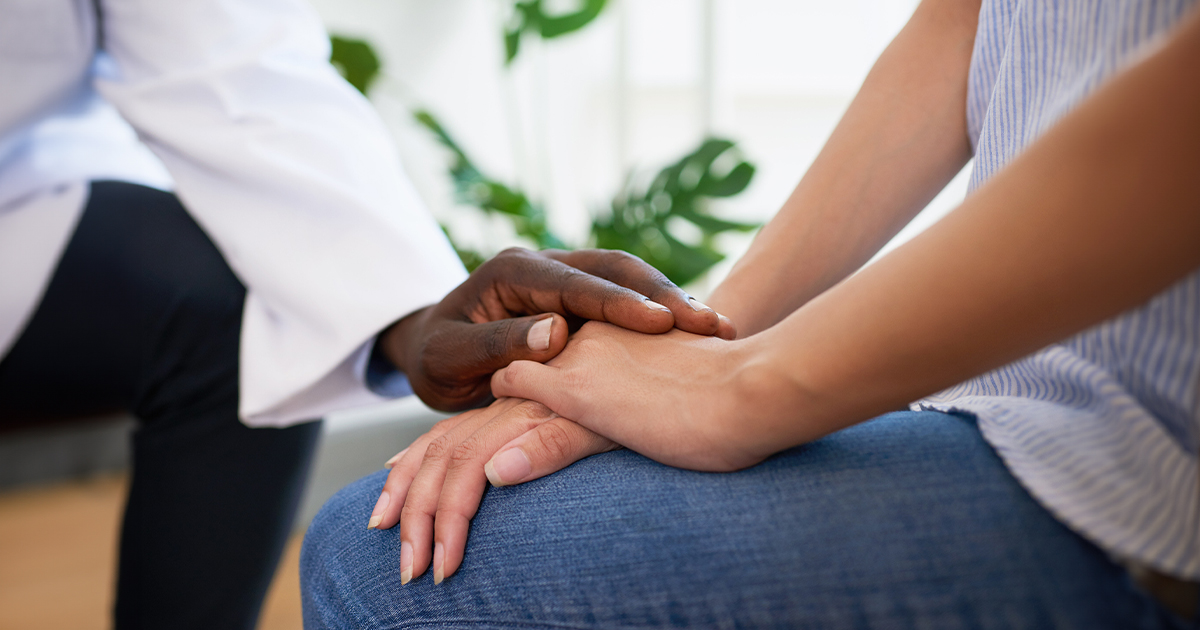Some days get the best of us. The train is late. There’s a pop quiz in class. Your boss is disappointed. The list goes on and on. It can be hard to feel happy when it seems like there are so many factors working against us.
The good news? There’s an easy way to boost your mood that’s completely within your control. And, plot twist, it involves boosting someone else’s first.
I’ve had 2 miscarriages, about 20 years apart. (I’m grateful to have also had 2 successful pregnancies.) My first miscarriage occurred when I was 11 weeks pregnant. I woke up in the middle of the night with intense, throbbing pain. I was alone downstairs and vividly remember muffling my cries.
Afterward, I didn’t know how to tell everyone around me what had happened. I knew that I didn’t want pity. Nor did I want to burden anyone with my pain. (In retrospect, this was unfair to myself because my loved ones truly wanted to show up for me). Plus, I was struggling to understand exactly why this had happened.
When I had my second miscarriage, I was almost 20 years older and my symptoms were much different. I knew something was wrong when I began heavily bleeding 3 weeks into my pregnancy. This time, I felt helpless because I knew what was happening. Again, I found it difficult to speak about it, especially because many people didn’t even know I was pregnant this time.
Like many others, I grappled with the “what ifs” and the feelings of guilt, shame, and failure. When I did decide to talk to those around me about what I’d gone through, I was met with a great deal of support and compassion. Eventually, I was able to see that there is life after a miscarriage. And though it’s hard, healing and resilience are possible.

Achieve your mental wellness goals
AbleTo programs give you 24/7 access to tools, activities, and content tailored to your needs. Sign up or log in to start exploring.

My story, sadly, isn’t unique
While we may not talk about it often, pregnancy loss is common.
When it happens before 13 completed weeks of pregnancy, it’s known as a miscarriage. (Some organizations stretch this timeline to 20 weeks). Miscarriages happen in about 10% of known pregnancies.
When a fetus dies in the uterus after 20 weeks, it’s called a stillbirth. In the U.S., stillbirth affects about 1 in 175 births each year.
Pregnancy loss can affect anyone. And although it often isn’t the result of something the birthing parent did or didn’t do, it can cause a lot of big, challenging feelings.
Many people are hit with waves of deep sadness, shame, disbelief, anger, and even numbness.
The experience can be difficult to process, let alone talk about. It certainly doesn’t help that so many people go through this process alone. That’s why I’m here to break the silence.
I hope it inspires others to do the same. Together, we can help more people get the support they need and deserve.
Shame and stigma persist
There are a couple of big reasons why.
First, as a society, we still don’t know how to talk about pregnancy loss. Our ancestors weren’t encouraged to speak openly about the difficult feelings it creates. So we don’t have a blueprint for how to have these deeply vulnerable conversations.
Second, because many losses happen in the first trimester, many people wait to disclose their pregnancy until later. This means that a birthing parent’s loved ones may never know that they were expecting, let alone that they suffered a loss.
You may feel that you can only talk about your loss in hushed tones or not at all. But the only way to end the stigma around pregnancy loss is by sharing our story. And by making space for others to do the same.
Tips for talking about your loss
When and how you decide to talk about your pregnancy loss is a deeply personal decision. Only you can decide what’s best for you. But these tips can help.
Share as much or as little as you’d like
At first, it may feel best to keep things simple by saying something like, “I had a miscarriage, but I don’t want to talk about it right now.” If an in-person update isn’t something you feel up to, consider sending an email or text. You can also ask a trusted loved one to update others on your behalf.
Set boundaries
After sharing your experience, you may be met with unwelcome questions like, “Why do you think this happened?” Or, “When do you think you’ll start trying again?” These can be painful to answer. Know that you can always end the conversation. People often don’t know what to say to comfort someone in these moments. But it isn’t your job to teach them or indulge their requests for more information. Here’s how to make setting boundaries easier.
Accept help
People will want to show up for you. It’s ok to let them. Try to be specific when sharing your needs. For example, you could ask your boss for time off work. Or for a friend to bring you lunch.
Open up
Sharing your experience can be healing. It may even quell feelings of shame and isolation. When you’re ready, consider opening up to a loved one, support group, or mental health provider. Remember: There’s no right or wrong way to do this. It may look messy at times. And that’s ok.
How to cope after pregnancy loss
Part of the grieving process is understanding that this loss can take a huge emotional toll. That’s normal and expected. How you choose to care for yourself afterward is, again, a highly personal decision. Here are a few strategies that can help.
Seek out support
For me, and many of my clients, it’s been helpful to talk to others who have also lost a pregnancy. These organizations can connect you with helpful resources:
- Share Pregnancy & Infant Loss Support
- Center for Loss in Multiple Births
- The Compassionate Friends
- Miscarriage Hurts
Working with a mental wellness professional can also help you process and move through complicated feelings. You may be eligible to work with one of AbleTo’s licensed therapists or highly trained behavioral coaches for little to no cost. Check your eligibility.
Prioritize self care
This includes setting healthy boundaries. Consider taking time off work. Request space from those around you. Ask your partner, if you have one, to support you in specific ways.
It can be tempting to push down the feelings and soldier on. But you and your body deserve time and space to process all you’ve been through. AbleTo has tools that can help.
Honor your pregnancy
Healing doesn’t mean that your pregnancy or baby are forgotten. Your experience will always be a part of you. That said, you may find it cathartic to hold a special ritual or event to honor the pregnancy that you had.
Support is available for partners, too
If your partner lost a pregnancy, you may be experiencing your own grief. Or, you might be processing the loss differently. Either way, you deserve support, too.
Some couples find that losing a pregnancy brings them closer. For others, it strains their relationship. You may be reluctant to share their feelings with your partner, who is already going through so much. That’s understandable. But communication is key.
Try opening up and listening to one another. If needed, a mental health provider can help guide these conversations.
You will get through this
I found it difficult to discuss my miscarriages. So I understand why people struggle to share their stories. But it is worthwhile.
Remember to be gentle with yourself. Seek out support when you need it. And, if nothing else, know that you are far from alone.
Need help putting these tips into practice?
You may be eligible for virtual therapy, coaching, or on-demand self care from AbleTo. Each program is designed by clinicians and grounded in science. Sign up today and get the support you deserve.
By Giselle Alexander, LCSW, AbleTo Program Advisor
Giselle Alexander is a licensed clinical social worker with over 15 years of providing culturally appropriate psychotherapy and social services to individuals and families. She received her clinical license to provide psychotherapy in 2010. Her training and experience come from a varied background of working in community mental health, social services, and private practice with individuals and families grappling with severe and persistent mental illness, anxiety, depression, grave disability, and end of life transitions. When she’s not connecting with her clients, she enjoys the outdoors, dancing, cooking, and spending time with her family and her rescue dog, Maggie.
Clinically reviewed by Hayley Quinn, PsyD.
Photo by Meeko Media/iStock. Individuals in photographs do not represent AbleTo participants.
The information featured on this site is general in nature. The site provides health information designed to complement your personal health management. It does not provide medical advice or health services and is not meant to replace professional advice or imply coverage of specific clinical services or products. The inclusion of links to other websites does not imply any endorsement of the material on such websites.


